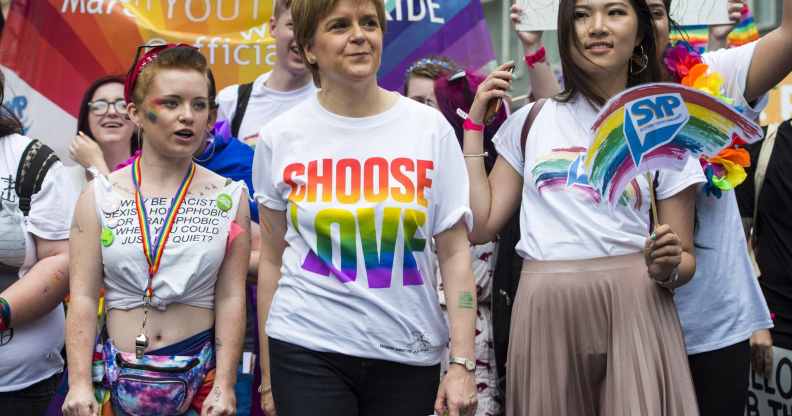Christian fundamentalists threaten to sue Scottish parliament over conversion therapy ban

First Minister Nicola Sturgeon at the 2018 Pride Festival in Glasgow. (SNS Group via Getty/ Ross MacDonald)
A Christian pressure group has threatened legal action against the Scottish parliament if it bans LGBT+ conversion therapy with what it calls “inadequate scrutiny”.
The Christian Institute (CI), a registered charity promoting a fundamentalist Christian viewpoint, said it is seeking to resist an “ill-thought-out conversion therapy ban” in Scotland.
The Holyrood Equalities, Human Rights and Civil Justice Committee (EHRCJ) backed a ban on LGBT+ conversion therapy in Scotland on Tuesday (25 January) after a petition calling for the practice to be banned was brought to the Scottish Parliament.
The committee has said that any legislation to ban conversion therapy should be full and comprehensive, and include any attempt to change a person’s gender identity or sexual orientation. Unlike the ban proposed by Westminster, the committee recommends that there is no loophole for “consenting” adults, and that religious forms of conversion therapy are banned.
The EHRCJ’s report on conversion therapy states: “The Committee is anxious to ensure that, in a similar way to legislation that exists to protect victims of domestic abuse or female genital mutilation, the definition makes it clear that consent to such practices can never be informed and should not be available as a defence to those undertaking conversion practices.
Campaign groups and LGBT+ activists have now urged the Scottish Government to bring in legislation, arguing that it should not wait to hear UK government proposals before pursuing Scotland-specific legislation.
The Christian Institute, however, claimed that a ban on conversion therapy could interfere with its “church activities”, and stated that legal action could be taken if the ban is not scrutinised highly enough.
We are pleased to announce that the @SP_EHRCJ has today released it's final report into our Petition PE1817.
We welcome the conclusion of the report that all forms of Conversion Practices are abhorrent and have no place in our society.
(1/x) https://t.co/sk3rYmoBuI
— End Conversion Therapy Scotland (@ECTScotland) January 25, 2022
In a letter to the EHRCJ, the CI claims that its concern stems from there being “no agreed definition of ‘conversion therapy’.”
“To some it means brutal pseudo-medical practices which are already illegal. To others it means merely teaching the Christian sexual ethic that sex is only for marriage and that marriage is between a man and a woman,” the CI’s deputy director Simon Calvert said.
Calvert added that the bans could outlaw “innocent, everyday church activities, including people praying for their friends.”
He said: “Inadequate scrutiny by parliament in this case may again result in human rights challenges being brought against any resulting legislation.”
The EJRCJ report notes that a majority of religious groups consulted by the Committee are in favour of a ban.
“It agrees that legislation should not pose any restrictions on ordinary religious teaching or the right of people to take part in prayer or pastoral care to discuss, explore or come to terms with their identity in a non-judgmental and non-directive way,” the report says.
“However, it heard evidence that most conversion practices take place within a religious setting including in the form of ‘talking therapy’ which is used with the intention to ‘correct’ sexuality or gender. The Committee believes and recommends that such practices should fall within a ban.”
A ban on conversion therapy in the UK has been on the table since 2018, when the Conservative government promised the LGBT+ community that it would ban the traumatising, dehumanising practice.
Since 2018, the ban on conversion therapy has been hit with a series of delays, leading campaigners to urge the Scottish parliament to push through its own Scottish-specific ban.
A UK consultation on ending the practice was intended to run for six weeks to gauge public opinion on the specifics of legislating the ban with the aim of bringing a draft to parliament by spring 2022, however in December 2021, the consultation was extended by a further eight weeks.
Campaigners have accused the Tories’ proposed ban of “falling short” by including a loophole for “religious counselling”.
At least two per cent of LGBT+ Britons have undergone conversion therapy, according to the UK government’s 2018 National LGBT Survey.
Of them, 51 per cent had it conducted by faith groups.

